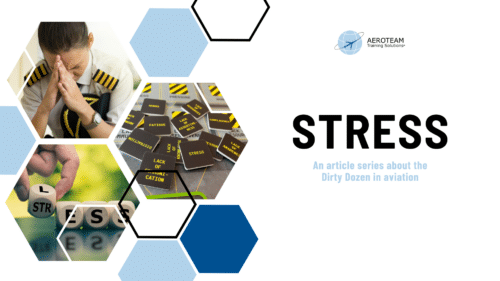The Dirty Dozen: Stress Increases the Risk of Errors
This article series sheds light on the 12 most common causes of human error, known as the Dirty Dozen (article 1 of 12).
Everybody knows stress. We talk about stress all the time. And we have all experienced stress.
But what is ‘stress’ in fact?
Stress is the body’s natural reaction to dangers, challenges, or demands. Stress may trigger a physical and mental response to help us react, perform, or adapt. While short-term stress can enhance our focus and performance, long-term stress can overwhelm our ability to cope, which may increase the risk of mistakes and burnout – and strain our health.
Read more: Fight, Flight, or Freeze: How Does Your Body React to Stress?
A Significant Contributor to Errors
Stress is one of the Dirty Dozen because the condition directly impacts how we think, act, and make decisions. An impact which often increases the likelihood of errors.
There are five key reasons why stress significantly contributes to errors:
1. Cognitive overload: Stress can overwhelm the brain, which makes it more challenging to concentrate, process information, or prioritise tasks effectively. Cognitive overload may reduce the ability to make decisions and increase the risk of overlooking or misinterpreting critical details.
2. Impaired communication: When you are stressed, you tend to become snappish and less clear when communicating. You may omit important details, misinterpret messages, or speak hastily. Tone, body language, and active listening may also be impaired, thus reducing the effect of the communication.
3. Reduced awareness: Under stress, people tend to develop tunnel vision. Tunnel vision limits your ability to notice details and process information properly, which can compromise safety and error mitigation.
4. Emotional responses: Long-term stress often generates frustration, irritability, and burnout which strains skills in communication and teamwork.
5. Physical effects: Stress is a natural reaction which triggers our primal instincts to either fight, flee, or freeze when we encounter perceived dangers or unknown situations. The reaction generates physical effects such as fatigue, increased heart rate, perspiration, and reduced fine motor skills.
When we understand how stress affects our performance, organisations within aviation can tailor training programmes to help pilots, cabin crew, and maintenance staff to recognise and manage stress. Safely and effectively.
Read more: Decisions Under Pressure: How Stress Affects Decision-Making


